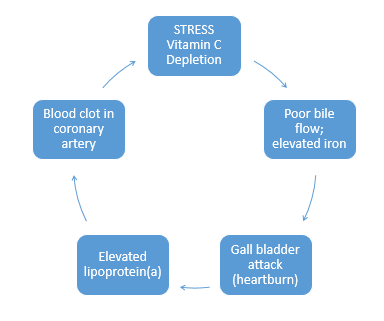Posted April 4, 2015: by Bill Sardi
For a long time now I have listened to numerous heart attack victims, including a brother and four other male friends, explain symptoms that occurred when they experienced their crushing-chest-pain heart attack. In all these cases it sounded like they were having a gall bladder attack, not a heart attack.
Their stories were common: chest pain after a meal, strong acid reflux sometimes relieved by antacids and sometimes a history of prior gallstone problems or gall bladder removal.
These symptoms were also accompanied by a period of excessive mental or emotional stress in their lives, a factor that is known to reduce vitamin C levels which I find is another ominous development that sets the stage for a heart attack. [Science Daily Aug 23, 1999]
These same heart attack-like symptoms can also be caused by a gall bladder attack when bile flow is impaired. (The gall bladder is an organ that squirts bile into the digestive tract to digest fats and oils as they are consumed.) In fact, a gall bladder attack may often be confused symptomatically with a heart attack.
Sure enough, I talked on the telephone to a doctor/friend who recently experienced a heart attack and the day after his heart attack he reports his stool was brownish-green, an indication of excessive bile.
Bile, produced in the liver, removes cholesterol (lipoprotein) particles from the body including an overlooked lipoprotein — lipoprotein(a).
In an earlier report I penned it was also noted that lipoprotein(a) is a devious culprit in heart disease. [Knowledge of Health Aug 5, 2013]
Due to iron overload bile will thicken and not flow well and cholesterol may accumulate in arteries, in particular lipoprotein(a).
It is only recently noted that gall bladder attacks are also accompanied by elevated lipoprotein(a) levels in blood circulation. [Journal International Medical Research March 11, 2015]
I have written a prior report about heartburn more likely being caused by bile acid, not by excessive stomach acid. [Knowledge of Health Nov 22, 2012]
A gall bladder attack may not only be confused with a heart attack, it may also precipitate a heart attack.
Recognize the sequence of disease here:
Don’t ignore symptoms of heartburn or indigestion that are relieved by antacids as these symptoms may be caused by poor bile flow that is also a sign that lipoprotein(a) levels are elevated.
Do not ignore the appearance of dark-green stool that is also a sign of high bile levels. Static bile flow (stasis) may then result in sticky blood clots being formed in coronary arteries if vitamin C deficient.
Thick bile is induced by iron overload, particularly in males, and elevated iron levels, as measured by the iron storage protein ferritin, also increase lipoprotein(a). [Journal Stroke Cerebrovascular Disease Oct 2013] Note: a healthy ferritin level is between 20-70 micrograms per liter of blood.
Taurine, an amino acid that controls iron and thins bile, and IP6 rice bran extract that chelates iron, may also be desirable antidotes to the bile-lipoprotein(a)-vitamin C deficiency-heart attack syndrome. [Life Science July 2006; Journal Animal Physiology Animal Nutrition Dec 2006]
Apple pectin and vitamin D lower lipoprotein(a) levels. [Thrombosis Research May 1, 1997; American Journal Clinical Nutrition April 2010]
If you have already experienced a heart attack or want to prevent a first-time heart attack, you need to supplement your diet with any of the following nutrients: vitamin C (a must), taurine, lysine/proline, apple pectin, vitamin D, IP6 rice bran extract.
Prescription of drugs that lower cholesterol and other typical cardiac drugs are frankly inappropriate as they do not address the primary cause of the coronary arterial blockage that could recur at any time after an initial heart attack.
For repair of scarred (fibrotic) heart muscle tissue after a heart attack it would be beneficial supplement the diet with chondroitin sulfate that was conclusively demonstrated to erase damage to heart muscle by Lester Morrison MD in the 1970s. [LewRockwell.com]
To make sense of all this, it appears heart attacks can be triggered in a short time. The mental image of a coronary artery slowly narrowing due to progressive accumulation of cholesterol over a period of many years which then results in a blood clot that blocks circulation to the heart is mistaken. Nor do cholesterol-lowering statin drugs reduce lipoprotein(a) and therefore don’t address the cause of the disease either.
A shortage of vitamin C, which is depleted by smoking and stress, sets the stage for thick bile, poor bile flow, elevated iron levels and a rise in lipoprotein(a) in the blood circulation that then induces the blood clots that produce a heart attack, and all this can occur rapidly.
This kind of stress-induced heart attack does not occur in animals that internally produce their own vitamin C. Vitamin C-deficient guinea pigs, who like humans don’t produce their own vitamin C internally, develop heart attacks whereas other animals that internally synthesize vitamin C are not prone to stress-induced heart attacks. [PLoS One 2012; Medical Hypotheses June 1979; Why Animals Don’t Get Heart Attacks But People Do, Matthias Rath, 2003]
— ©2015 Bill Sardi, Knowledge of Health, Inc.

Posted in Heart ; No Comments »
11
17
52
95
14
24
237
6
56
43
10
116
15
66
105